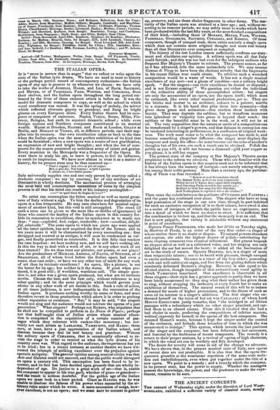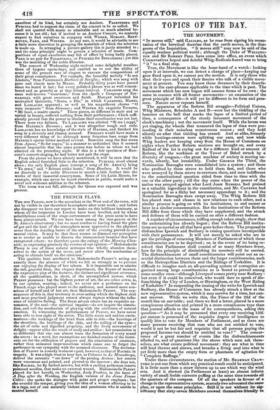THE ANCIENT CONCERTS.
Tag concert of Wednesday night, under the direction of Lord Wser• MORELAND, exhibited a sufficient variety of classical music, mostly excellent of its kind, but certainly not Ancient. PALESTRINA and PenicELL had to support the claim of the concert to be so called. We shall not quarrel with music so admirable and so much admired be- cause it is not old; but if invited to an Ancient Concert, we scarcely expect to find ourselves in company with WEBER, MOZART, BEET.. Noway, PALER, and WINTER. At any rate, it would be advisable to use a little more discretion in grouping the materials of which the selection is made up. In arranging a picture-gallery this is justly attended to ; and the same principle ought to govern a selection of music. Com- positions of equal excellence may fail of effect by being badly placed. Rum is no pair for PsixerRisis, or Ptraccu. for Zurosirvr,r4 ; yet this was the matching of the noble Director. The concert of Wednesday night revived some delightful recollec- tions of bygone opera-days, and enabled us to test the ability of some of the present race of singers to execute the compositions of their great countrymen. For example, the beautiful melody "To son Lindoro," from PAISIELLO'S Barbiere di Seniglia ; which was sung with pure and classic taste by Memo. Probably thirty years have passed since we heard it last ; but every polished phrase was as well remem- bered and as grateful as at that distant interval. CARADORI sang the once well-known " Guardami," from the Apelk e Campaspe of ZIN- GARELLI, with great sweetness and finish. MOZART furnished his unrivalled Quintetto, " Sento, o Dio," in which CARADORI, MARIO, and LABLACHE appeared; as well as his magnificent chorus "0 voto tremendo " from Idomeneo ; and WINTER his exquisite Terzetto, "Mi lasci, o madre ornate." These pieces, so different in style and so varied in beauty, suffered nothing from their performance ; which suffi- ciently proved that the power to disclose their excellencies was not lost. There were two failures. To LABLACHE was allotted "Si tra i ceppi," from HANDEL'S Berenice ; and it was altogether rough and rude. LABLACHE has no knowledge of the style of HANDEL, and finished his song in a slovenly and clumsy manner. Plumps would have made a very different thing of it; although many forgotten bass songs from HANDEL'S operas better merited revival. RONCONI sang the fine scene from Agnese," Se fur sogno," in a manner so unfinished that it seemed almost impossible that the same person was before us whom we had admired on the preceding night. If this is a fair specimen of Rom- cozies concert-singing, he had better not quit the stage. From the pieces we have already mentioned, it will be seen that the English school furnished little to the selection. PURCELL stood almost alone; the only English piece (except a song of Dr. ARNE'S) being "To arms," and "Britons strike home," from Bonduca. It would be no discredit to the noble Directors to search a littk further into the works of their immortal countryman. Some of his Latin Motets, for example, which can never be heard elsewhere in public, would make a novel and welcome addition to the schemes.
The room was not full, although the Queen was expected and was present.



























 Previous page
Previous page